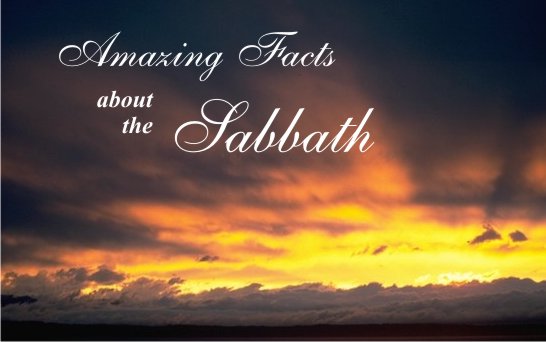
The Seventh Day Sabbath
1. After working the first six days of the week in creating this earth, God rested on the seventh day. Genesis 2: 1-3.
2. Every time we rest upon it, as God did at creation, we commemorate that majestic event.
3. As a memorial of creation, it can no more be changed to a day on which He did not rest than you can change your birthday to a day on which you were not born.
4. The Creator blessed the seventh day. Genesis 2:3.
5. He sanctified the seventh day. Genesis 2:3.
6. It was made before the fall; therefore it is not a type, for types were not introduced till after the fall.
7. Jesus says it was made for man (Mark 2:27), that is, for the race; the word man is here unlimited; hence, everyone is included.
8. It was given to Adam, the head of the human race, and through him to all his descendants.
9. It is not a Jewish institution, for it was made 2,300 years before there was a Jew.
10. The Bible never calls it the Jewish Sabbath, but always "the Sabbath of the Lord thy God."
11. Reference is made to the Sabbath and the seven-day week in the patriarchal age. Genesis 2:1-3; 8:10, 12; 29:27, 28.
12. It was a part of Godís law before Sinai. Exodus 16:4, 27-29.
13. God placed it in the heart of His moral law, the ten commandments. Exodus 20:1-17. He placed it there! It belongs with the other nine precepts.
14. The seventh day Sabbath was commanded by the voice of the living God. Deuteronomy 4:12, 13.
15. Then He wrote the commandment with His own finger. Exodus 3 1:18.
16. He engraved it in the enduring stone indicating its imperishable nature. Deuteronomy 5:22.
17. It was sacredly preserved in the ark in the holy of holies. Deuteronomy 10:1-5.
18. God forbade work upon the Sabbath, even in the most pressing times. Exodus 34:21.
19. The keeping of the Sabbath is a sign of loyalty to the true God. Ezekiel 20:20.
20. God promised that Jerusalem should stand forever if the Jews would keep the Sabbath. Jeremiah 17:24, 25.
21. One of the reasons God sent them into the Babylonian captivity and destroyed Jerusalem was for breaking it. Nehemiah
13:18; Jeremiah 17:27.
22. God has pronounced a special blessing on all the Gentiles who will keep the Sabbath. Isaiah 56:6, 7.
23. God has promised to bless all who keep it. Isaiah 56:2.
24. The Lord requires us to call it "honorable." Isaiah 58:13. Be wary of maligning a day which the Lord has honored.
25. The Saabbath is to be restored in the last days. Isaiah 58:12, 13.
26. All of Godís prophets kept the seventh day.
27. When the Son of God came, He kept the seventh day all His life. Luke 4:16; John 15:10. Shall we not be safe in following His example?
28. The seventh day is the "Lordís day." See Mark 2:28; Revelation 1:10; Isaiah 58:13; Exodus 20:10.
29. Jesus is Lord of the Sabbath. Mark 2:28.
30. When Jesus began His work, He expressly declared, "Think not that I am come to destroy the law, or the prophets." Matthew 5:17.
31. He taught that "it is lawful to do well on the sabbath." Matthew 12:12.
32. Jesus condemned the Pharisees as hypocrites for pretending to love God, while at the same time they made void one of the Ten Commandments and taught instead "the commandments of men." Matthew 15:3-9.
33. He instructed His apostles that the Sabbath should be prayerfully regarded for an event to take place forty years after His resurrection. Matthew 24:20.
34. Jesus rested on the Sabbath after His work of redemption on the cross. Mark 15:42-47; Luke 23:54-56.
35. After His death, the women carefully observed the seventh day Sabbath, before coming to finish preparing His body for burial. Luke 23:56.
36. Paul, the apostle to the Gentiles, called it the "sabbath day" in AD. 45. Acts 13:27.
37. Luke, the inspired Christian historian, writing as late as ~ 62, calls it the "sabbath day." Acts 13:14,44.
38. The Gentile converts called it the Sabbath. Acts 13:42.
39. In the great Christian council, A.D. ~ in the presence of the apostles and thousands of disciples, James calls it the "sabbath day." Acts 15:2 1.
40. It was customary to hold prayer meetings upon that day. Acts 16:13.
41. Paul read the Scriptures in public meetings on that day. Acts 17:2, 3.
42. It was his custom to preach upon that day. Acts 17:2,3.
43. There was never any dispute between the Christians and the Jews about the Sabbath day. This is proof that the Christians still observed the same day that the Jews did.
44. In all their accusations against Paul, they never charged him with disregarding the Sabbath day.
45. Paul himself expressly declared that he had kept the law. "Neither against the law of the Jews, neither against the temple, nor yet against Caesar, have I offended any thing at all." Acts 25:8. How could this be true if he had not kept the Sabbath?
46. The Sabbath is mentioned in the New Testament fifty-nine times, and always with respect, bearing the same title it had in the Old Testament, "the sabbath day."
47. Not a word is said anywhere in the New Testament about the Sabbathís being abolished, changed, or anything of the kind.
48. God has asked us to remember it, to keep it holy, and to refrain from common labor. Exodus 20:8-11.
49. The New Testament does not have any record of Christians working on the Sabbath day.
50. There is no record that God has ever removed His blessing or sanctification from the seventh day.
51. As the Sabbath was kept in Eden before the fall, so it will be observed eternally in the new earth after the restoration. Isaiah 66:22, 23.
Sunday, the First Day of the Week
1. The word Sunday is not in the Bible; it is simply called the "first day of the week."
2. God did not rest upon it.
3. Christ did not rest upon it.
4. Jesus was a carpenter (Mark 6:3), and worked at His trade until He was thirty years old. He kept the Sabbath and worked six days in the week, as all admit. Hence He did many a hard dayís work on Sunday.
5. It has never been blessed by any divine authority.
6. It has never been sanctified.
7. No Biblical law was ever given to enforce the keeping of it, no penalty is provided for its violation; thus it is no transgression to work upon it. "Where no law is, there is no transgression." Romans 4:15. See also 1 John 3:4.
8. No blessing is promised for its observance.
9. No Biblical regulation is given as to how it ought to be observed.
10. The Bible never calls it the Christian Sabbath.
11. The Bible never calls it the Sabbath day.
12. The Bible never calls it the "Lordís day."
13. The Bible never even calls it a rest day.
14. Jesus never mentioned it in any way, never took its name upon His lips, so far as the record shows.
15. The first day of the week is mentioned only eight times in all the New Testament. Matthew 28:1; Mark 16:2, 9; Luke 24:1; John 20:1,19; Acts 20:7; 1 Corinthians 16:2.
16. Five of these texts refer to the resurrection account.
17. Paul directed the saints to get their offerings ready on that day. 1 Corinthians 16:2.
18. In all the New Testament we have a record of only one religious meeting held upon that day; it was held at night, it was a farewell meeting for Paul, it lasted till at least midnight; hence it was not a weekly Sabbath meeting. Acts 20:7-12.
19. The breaking of bread recorded here is not a weekly Sabbath communion service. It was done at night. Verses 7-11. The disciples sometimes broke bread every day. Acts 2:42-46. Jesus celebrated the last supper on Thursday evening. Luke 22.
20. There is no record that they ever held another meeting on Sunday before or after that.
21. The Bible nowhere says that the first day of the week commemorates the resurrection of Christ. This is a tradition of men. Matthew 15:1-9. Baptism commemorates the burial and resurrection of Jesus. Romans 6:3-5.
22. The New Testament is totally silent with regard to any change of the Sabbath day or any sacredness for the first day.
Saturday, the seventh day, is the Sabbath of the Lord in both the Old and New Testaments.
Examine the reasons for observing the first day of the week instead of the day which God sanctified; there is no evidence in the Scriptures that the fourth commandment has been abolished, or that the Sabbath has been changed. The blessing which first hallowed the seventh day has never been removed.
 |
The Seal of God
The three essential components of a royal seal are: the name of the ruler, his official title, and the territory over which he governs. An example would be "Cyrus, King of Persia." We find these three elements in the fourth commandment at the heart of Godís law. "For in six days the Lord made heaven and earth, the sea, and all that in them is." Exodus 20:11.
Nameó"Lord" (Yahweh)
Titleó"Maker, or Creator"
Territoryó"heaven and earth"óthe whole universe. See Exodus 20:8-11; Psalm 33:6, 9;John 1:1-4.
The fourth commandment contains Godís name, title and dominion. It is His seal, stamped in the midst of His ten commandments, proclaiming the authority of Godís law
The fourth commandment, written in your heart and mind, proclaims Godís sovereignty in your life and seals you as one of His children, a citizen of His kingdom.
"I also gave them My Sabbaths, to be a sign (seal) between them and Me, that they might know that I am the Lord Who sanctifes them.... Hallow My Sabbaths, and they will be a sign (seal) between Me and you, that you might know that I am the Lord your God." Ezekiel 20:12, 20; see also 36:26-29.
Note: Sign and seal are used interchangeably in Scripture. See Romans 4:11.
|
|
